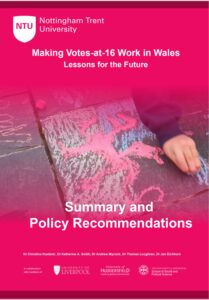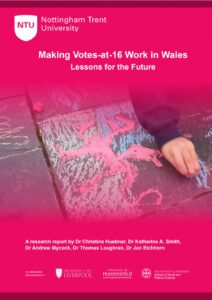Young people aged 16 and 17 can now vote in Welsh elections. The 2021 Welsh Parliament elections were the first in which 16- and 17-year olds in Wales were allowed to vote. How did this first time opportunity turn out for young people? This is what we researched in this project. The ‘Making Votes at 16 work in Wales’-project evaluated young people’s experiences of the 2021 Senedd elections in Wales to find out what works to mobilise 16- and 17-year olds, especially those from traditionally underrepresented groups, to turn out to vote.
We are pleased to announce the publication of our policy report ‘Making Votes-at-16 Work in Wales: Lessons for the Future’.
 |
|
|---|---|
| Download report | Download summary |
On 8th November 2021, the project team in collaboration with the Welsh Government Local Government Democracy Division hosted an online event presenting new original evidence from the research with young people into their experiences of the 2021 Senedd election. The research presentation was the basis for a joint discussion on which lessons can be learnt from this first edition of Votes-at-16 in Wales for future Welsh elections. Watch it here: https://youtu.be/btysc48T18w
The project is funded by the Joseph Rowntree Reform Trust’s UK Democracy Fund. It connects stakeholders in Wales with national and international stakeholders.
Find out more about our funders here: https://www.jrrt.org.uk/uk-df-franchise-in-wales/
